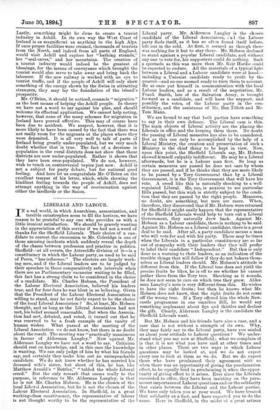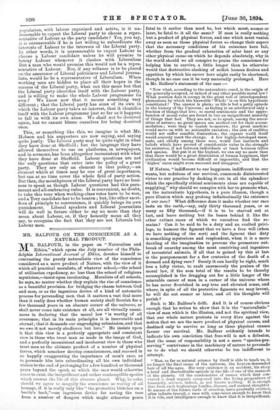LIBERALS AND LABOUR.
IN a sad world, in which Anarchism, assassination, and terrible catastrophes seem to fill the horizon, we have reason to be grateful to any one who provides us with a, little ironical satisfaction. We should be gravely wanting in the appreciation of this service if we had not a word of thanks for the Sheffield Liberals. Their choice of a can- didate to contest the succession to Mr. Coleridge is one of those amusing incidents which suddenly reveal the depth of the chasm between profession and practice in politics. Sheffield—at all events, the Attercliffe division of it—is a constituency in which the Labour party, as used to be said of Peers, " has influence." The electors are largely work- ing men, and if the Liberal leaders are to be judged by their speeches in those comparatively safe intervals when there are no Parliamentary vacancies waiting to be filled, this fact has a strong claim to be considered in the choice of a candidate. Mr. Charles Hobson, the President of the Labour Electoral Association, believed his leaders true, and for four days he was blest in so believing. Given that the President of the Labour Electoral Association is willing to stand, may he not fairly expect to be the choice of the local Liberal Association ? So, at least, Mr. Hobson thought, and as long as the Liberal Association had not met, his belief seemed reasonable. But when the Associa- tion had met, debated, and voted, it turned out that he was reserved to be a fresh example of the vanity of human wishes. What passed at the meeting of the Liberal Association we do not know, but there is no doubt about the result. The meeting was " practically unanimous in favour of Alderman Langley." Now against Mr. Alderman Langley we have not a word to say. Criticism should rest on knowledge. and in this case the knowledge is wanting. We can only judge of him by what his friends say, and certainly they make him out an unimpeachable candidate. We do not know whether he has married his deceased wife's sister, but short of this, he has, like Matthew Arnold's " Bottles," " tabled the whole Liberal creed." But the only remark that seems really to the purpose, in reference to Mr. Alderman Langley, is that he is not Mr. Charles Hobson. He is the chosen of the local Liberal Association, but he is not the chosen of the Labour Electoral Association. In Sheffield, in a great working-class constituency, the representative of labour is not thought worthy to be the representative of the Liberal party. Mr. Alderman Langley is the chosen candidate of the Liberal Association, L n I the Labour party finds itself, as it has so often found itself before, left out in the cold. At first, it seemed as though there was nothing for it but to stay there. Mr. Hobson declined to stand against a popular Liberal candidate, and without any one to vote for, his supporters could do nothing. Such a spectacle as this was more than Mr. Keir Hardie could be expected to endure. All the materials of a typical fight between a Liberal and a Labour candidate were at hand— including a Unionist candidate ready to profit by the quarrel—and no one seemed ready to turn them to account. He at once put himself in communication with the local Labour leaders, and as a result of the negotiation, Mr. Frank Smith, late of the Salvation Army, is brought forward as a candidate, and will have the support, and possibly the votes, of the Labour party in the con- stituency, and the assistance of Mr. Ben Tillett and Mr. Tom Mann.
We are bound to say that both parties have something to say in their own defence. The Liberal case is this. The main objects of Liberal activity are the placing the Liberals in office and the keeping them there. No doubt the passing of Liberal measures has also to be considered. But as this can only be accomplished by the help of a Liberal Ministry, the creation and preservation of such a Ministry is the chief thing to be kept in view. Now, upon this point, the Sheffield Liberals say, Mr. Hobson showed himself culpably indifferent. He may be a Liberal afterwards, but he is a Labour man first. So long as certain measures are passed he does not care by whom they are passed, and if he thinks that they are more likely to be passed by a Tory Government than by a Liberal Government, it is the Tory Government that will have his vote. A creed like this is naturally shocking to a well- regulated Liberal. He, too, is anxious to see particular Bills passed, but this wish is strictly subject to the condi- tion that they are passed by the right people. Measures, no doubt, are something. but men are more. When, therefore, they discovered that if Mr. Hobson were returned for Sheffield it might easily happen that the representative of the Sheffield Liberals would help to turn out a Liberal Government, they naturally drew back. Against Mr. Hobson as a Labour candidate, there is nothing to be said. Against Mr. Hobson as a Liberal candidate, there is a great deal to be said. After all, a party candidate means a man who will vote for and with his party. There may be times when the Liberals in a particular constituency are so far out of sympathy with their leaders that they will prefer to label their candidate " Independent." But this is only done as a warning to their leaders, as an indication of the terrible things that will follow if they do not behave them- selves as Liberal leaders should. Mr. Hobson's attitude is different from this. If the Liberal tree does not yield the precise fruits he likes, he is off to see whether he cannot gather them from the Tory tree. Shocking as it sounds, he does not seem to care on which tree they grow. Alder- man Langley's note is very different from this. He wishes to have the right fruits ; but then he knows what Mr.
Hobson does not know, that the right fruits do not come off the wrong tree. If a Tory offered him the whole New- castle programme in one omnibus Bill, he would say something unpleasant about figs and thistles and decline the gift. Clearly, Alderman Langley is the candidate the Sheffield Liberals want.
But Mr. Hobson and his friends have also a case, and a case that is not without a strength of its own. Why, they may fairly say to the Liberal party, have you misled us about your attitude to Labour questions ? We under- stand what you say now at Sheffield ; what we complain of is that it is not what you have said at other times and in other places. There are two ways in which Labour questions may be looked at, and we do not expect every one to look at them as we do. But we do expect those who have proclaimed their agreement with us when there was no opportunity of giving the proclamation effect, to be equally loud in proclaiming it when the oppor- tunity of giving effect to it arises. Ever since the Liberals succeeded to office, they have been insisting on the para- mount importance of Labour questions and on the solidarity that exists between the Liberal and the Labour parties. We have only taken you at your word. We have treated that solidarity as a fact, and have expected you to do the same. Here in Sheffield, in the midst of a great artisan population, with labour organised and active, is it un- reasonable to expect the Liberal party to choose a repre- sentative of Labour as the party candidate ? Yes, you say, it is unreasonable if he is not willing to subordinate the interests of Labour to the interests of the Liberal party. In other words, it is unreasonable to expect Labour to choose a Labour candidate unless he will promise to betray Labour whenever it clashes with Liberalism But a man who would promise this would not be a repre- sentative of Labour. Nor, if any reliance is to be placed on the assurance of Liberal politicians and Liberal journa- lists, would he be a representative of Liberalism. When working men are bidden to place all their hopes in the success of the Liberal party, what can this mean but that the Liberal party identifies itself with the Labour party, and is willing to make the whole Labour programme its own We know now that it means something very different ; that the Liberal party has aims of its own in which the Labour party takes no interest, that it identifies itself with the Labour programme just so far as it happens to fall in with its own aims. We shall not be deceived again, but we cannot blame ourselves for being deceived once.
This, or something like this, we imagine is what Mr. Hobson and his supporters are now saying, and saying quite justly. The Liberal party may be quite right in what they have done at Sheffield; but the language they have allowed themselves to use on platforms, in newspapers, and in sermons, has been altogether inconsistent with what they have done at Sheffield. Labour questions are not the only questions that enter into the policy of a great party. They are only an element in that policy,—an element which at times may be one of great importance, but can at no time cover the whole field of party action. But then, the mouthpieces of the Liberal party have no busi- ness to speak as though Labour questions had this para- mount and all-embracing value. It is convenient, no doubt, to take this tone when working-class votes have to be won, and a Tory candidate has to be beaten ; but, like other sacri- fices of principle to convenience, it quickly brings its own punishment. Liberal speakers and Liberal journalists will do well in future either to say no more than they mean about Labour, or, if they honestly mean all they say, to recognise the fact that they are not Liberals but Labour men.



















































 Previous page
Previous page